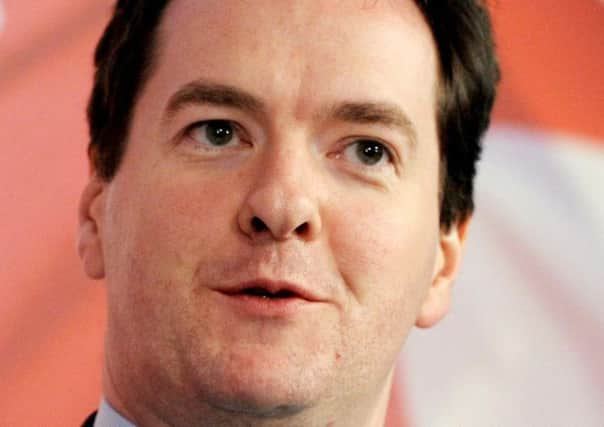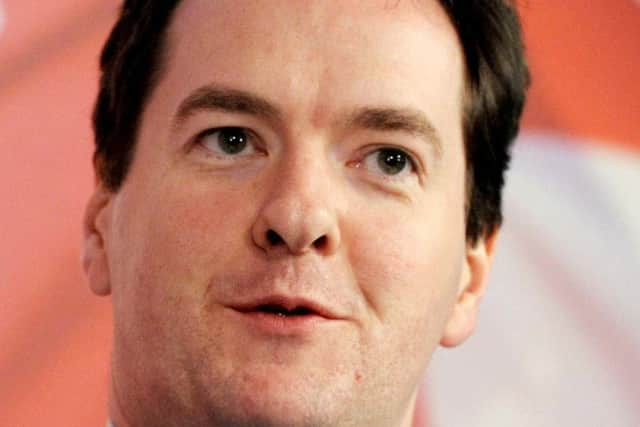Osborne pledges to sell majority shares in Royal Bank of Scotland


Mr Osborne said the “decision point” had been reached after an independent review concluded the losses to the taxpayer would be more than offset by the profits on other bank share sales - including its stake in the Lloyds Banking Group.
The move has been endorsed by Bank of England Governor Mark Carney who warned that delaying the start of the sale could lead to the taxpayer losing even more.
Advertisement
Hide AdAdvertisement
Hide AdIt comes after the then Labour government injected a total of £45.5 billion into RBS - taking a 79% stake in the bank - to prevent its collapse in the wake of the crash of 2008.


In his annual Mansion House speech to the City, Mr Osborne said that the size of the Government’s holding meant that the sell-off would take “some years” to complete.
While the complexity meant that the first offering - to take place in the coming months - would be to the financial institutions only, he said future disposals could include ordinary investors.
An independent review by Rothschild advised that if the RBS shares were sold in one go at their price on June 5 the loss to the taxpayer would be an estimated £7.2 billion.
Advertisement
Hide AdAdvertisement
Hide AdHowever that compares with an estimated overall profit of more than £14 billion if all the Government’s remaining bank shares were sold - as against a forecast loss of £20 to £50 billion at the time of the bail-outs.
Mr Osborne said: “In the coming months we will begin to sell our stake in RBS. It’s the right thing to do for British businesses and British taxpayers.
“Yes, we may get a lower price than Labour paid for it. But the longer we wait, the higher the price the whole economy will pay.
“And when you take the banks in total, we’re making sure taxpayers get back billions more than they were forced to put in.
Advertisement
Hide AdAdvertisement
Hide Ad“From bailing out the banks to bringing them back from the brink, now is the time for RBS to rebuild itself as a commercial bank no longer reliant on the state, but serving the working people of Britain.”
In a letter to the Chancellor, Mr Carney said public ownership of RBS had “largely served its purpose” and that a “phased return” to private ownership would promote financial stability.
“Continued public ownership without a foreseeable end point runs risks including limiting RBS’ future strategic options, and continuing the perception that taxpayers bear responsibility for RBS losses,” he said.
“In these regards, there could be considerable net costs to taxpayers of further delaying the start of a sale.”
Advertisement
Hide AdAdvertisement
Hide AdIn his address, Mr Osborne also outlined how the Government would use its re-negotiation of Britain’s EU membership terms to ensure “fairness” for countries like the UK which remained outside the euro while preserving the integrity of the single market.
“We need a settlement that recognises that while the single currency is not for all, the single market and the European Union as a whole must work for all,” he said.
“It’s in our interests that the euro is a successful, strong currency. So we’re prepared to support the eurozone as it undertakes the further integration it needs.
“But in return, we want a settlement between the UK and the eurozone that protects the single market and is stable, fair and lasts.”
Advertisement
Hide AdAdvertisement
Hide AdMr Osborne also announced plans to push ahead with tough new fiscal rules that will force governments to run a surplus when the economy is in good health.
The Chancellor confirmed plans for a “balanced budget” principle policed by an independent watchdog.
Claiming the general election result represented a “comprehensive rejection of those who argued for more borrowing and more spending”, he will also challenge Labour to back the new rules in a Commons vote later this year.
The proposals for a tougher fiscal framework overseen by the Office for Budget Responsibility (OBR) were first set out by Mr Osborne in January.
Advertisement
Hide AdAdvertisement
Hide AdThe current rules introduced by the coalition require the Government to eradicate the structural deficit by the end of a rolling three-year forecast period.
But in future ministers are expected to have to ensure that they spend less than is coming into the public coffers when the economy is operating “normally” - as defined by the OBR.
Mr Osborne is due to give more details of the scheme in the Budget next month. But he will tell City figures at the Mansion House he wants a “new settlement” to protect the country from an “uncertain future”.
“I come to move Britain from crisis and recovery, and towards a new settlement of responsibility and prosperity,” he will say.
Advertisement
Hide AdAdvertisement
Hide Ad“Without sound public finances there can be no lasting economic security - and without economic security there can be no lasting economic prosperity.
“So the new settlement for the British economy I talk about starts with a new settlement in the way we manage our national finances.
“With our national debt unsustainably high, and with the uncertainty about what the world economy will throw at us in the coming years, we must now fix the roof while the sun is shining.
“Indeed we should now aim for a permanent change in our political debate and our approach to fiscal responsibility - just as they have done in recent years in countries like Sweden and Canada.”
Advertisement
Hide AdAdvertisement
Hide AdMr Osborne will argue that in the wake of the election it should be “accepted across the political spectrum that without sound public finances, there is no economic security for working people”.
He will add: “Therefore, in normal times, governments of the left as well as the right should run a budget surplus to bear down on debt and prepare for an uncertain future.
“In the Budget we will bring forward this strong new fiscal framework to entrench this permanent commitment to that surplus, and the budget responsibility it represents.
“This fiscal framework will be voted on by the House of Commons later this year, and assessed by the Office for Budget Responsibility we created.
Advertisement
Hide AdAdvertisement
Hide Ad“I trust this new settlement for responsible public finances will now command broad support.”
Mr Osborne will say Britain should not “look on from the sidelines as other parts of the world pioneer new science, promote new business, take forward new art and say to my two young children: ‘that used to be us; that used to be Britain’.”
Restating his belief that the UK can be the most prosperous major economy in the world within a generation, the Chancellor is to add: “Working together, achieving these new settlements for our public finances, for our financial services, and for fairness in Europe, will help us secure that bright future for us all.”